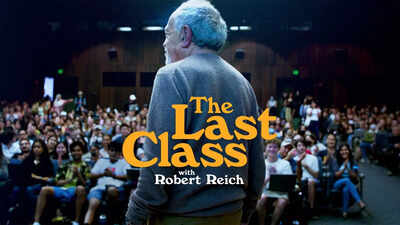Documentary ‘The Last Class’ on Robert Reich’s final UC Berkeley semester becomes surprise hit: Is teaching at public universities more impactful than at private ones?

A new documentary film chronicling the final semester of Robert Reich’s teaching career at UC Berkeley has become an unexpected success, earning $700,000 at the box office despite limited release. The Last Class, directed by Elliot Kirschner, captures the concluding chapter of Reich’s 42-year tenure as a professor, focusing on his popular class Wealth and Poverty. Reich, an economist and former US Labour Secretary under President Bill Clinton, has also served as an economic adviser to President Barack Obama and assistant to the solicitor general in the Ford administration. The documentary highlights both his classroom style and his broader impact on education and economics, as reported by the Sfgate.A professor’s final semester The film opens with Reich engaging warmly with students on the UC Berkeley campus, even taking selfies and signing a sneaker for a fan. His popularity among students is evident, underscoring his status as a campus figure. “I’ve been a professor, a teacher, for 42 years. I’ve done a lot of other things, but I’ve always come back to teaching. That’s been my home,” Reich says early in the film, as quoted by the Sfgate. Reich’s decision to end his teaching career in 2023 comes after deep reflection on his ability to continue performing at the same level. Although he dislikes the word “retirement,” he chose to conclude his teaching chapter while still fully engaged. The documentary captures his dynamic approach in the classroom, where he closely monitors student reactions and employs interactive exercises to explain complex topics like wealth disparity.Teaching at a public university Reich contrasts his experience at UC Berkeley with his former teaching role at Harvard, praising Berkeley’s public university status for its diverse student body. He notes that Berkeley students come from a wider range of socioeconomic backgrounds and generally exhibit less entitlement compared to private university peers, as reported by the Sfgate. The film’s 71-minute runtime includes classroom scenes that evoke nostalgia for university life while avoiding heavy economic theory. Instead, it focuses on Reich’s humanity and his commitment to education as a cornerstone of democracy. He emphasises teaching students how to think critically rather than what to think.Legacy beyond government service Outside the classroom, Reich is well known for his government roles and as a media commentator on economic issues. He co-founded Inequality Media Civic Action, an educational economics nonprofit, and authored several best-selling books, including The System: Who Rigged It, How We Fix It, as reported by the Sfgate. Despite his extensive career, the documentary suggests that Reich’s teaching remains the defining element of his legacy. UC Berkeley students and alumni alike are likely to feel the impact of his departure from the lecture hall.The Last Class highlights not only the conclusion of a distinguished academic career but also raises questions about the role of public universities in shaping minds across socioeconomic lines. The film’s surprising commercial success points to a broad public interest in education and its societal importance, as reflected in box office returns.Public versus private: A question of impact Reich reflects on his time teaching at both private and public institutions, drawing a clear contrast between the student bodies. As reported by the Sfgate, he praises UC Berkeley’s public university environment for its diversity and lower levels of entitlement among students, compared to his earlier experience at Harvard. While the documentary highlights this distinction, it leaves open the broader question of whether teaching at public universities results in a deeper or more lasting impact





